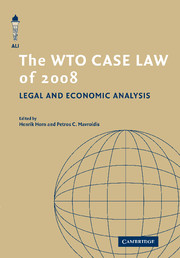Book contents
- Frontmatter
- Contents
- Foreword
- Introduction
- Appellate Body Report in EC–Bananas III: waiver-thin, or lock, stock, and metric ton?
- Guilt by association: US – Measures Relating to Shrimp from Thailand and US – Customs Bond Directive for Merchandise Subject to Anti-Dumping/Countervailing Duties
- Mexico–Olive Oil: Remedy without a cause?
- US–Stainless Steel (Mexico)
- Continued Suspense: EC–Hormones and WTO Disciplines on Discrimination and Domestic Regulation
- United States – Subsidies on Upland Cotton Recourse to Article 21.5 by Brazil
- China – Measures Affecting Imports of Automobile Parts
- India – Additional and Extra-Additional Duties on Imports from the United States
- Comment: India – Additional and Extra-Additional Duties on Imports from the United States
US–Stainless Steel (Mexico)
Published online by Cambridge University Press: 07 September 2011
- Frontmatter
- Contents
- Foreword
- Introduction
- Appellate Body Report in EC–Bananas III: waiver-thin, or lock, stock, and metric ton?
- Guilt by association: US – Measures Relating to Shrimp from Thailand and US – Customs Bond Directive for Merchandise Subject to Anti-Dumping/Countervailing Duties
- Mexico–Olive Oil: Remedy without a cause?
- US–Stainless Steel (Mexico)
- Continued Suspense: EC–Hormones and WTO Disciplines on Discrimination and Domestic Regulation
- United States – Subsidies on Upland Cotton Recourse to Article 21.5 by Brazil
- China – Measures Affecting Imports of Automobile Parts
- India – Additional and Extra-Additional Duties on Imports from the United States
- Comment: India – Additional and Extra-Additional Duties on Imports from the United States
Summary
Abstract: The US–Mexico Stainless-Steel dispute presents two interesting questions. First, what role does and should stare decisis (precedent) play in the WTO dispute-resolution system? Second, are there circumstances under which exceptional methodologies, i.e. ‘zeroing’, can better achieve the stated objectives of the agreement than the standard methodologies explicitly stated in the agreement? We argue that the institutional structure and foundational norms of the WTO imply the need for Panels to be bound by the prior decisions of the Appellate Body. Our economic analysis describes the costs and benefits of legal systems with and without precedent. Regarding methodology, we argue that any analysis of the suitability of a methodology (i.e. ‘zeroing’) must be undertaken jointly with an analysis of the underlying objective of the agreement (i.e. remedying injury). We conclude that, under limited circumstances, the ‘zeroing’ methodology is more effective at remedying injury than the ordinary methodology outlined in the Anti-Dumping Agreement.
Introduction
Background
On 26 May 2006, Mexico requested consultations with the United States (US) regarding how the US was calculating dumping margins. The parties held consultations on 15 June 2006, but the dispute could not be resolved. On 12 October 2006, Mexico requested the Dispute Settlement Body (DSB) to establish a Panel to examine the matter. The Panel was established on 26 October 2006. Several countries retained their rights to participate in the Panel as third parties. The Panel met with the parties in May and July of 2007.
- Type
- Chapter
- Information
- The WTO Case Law of 2008 , pp. 117 - 150Publisher: Cambridge University PressPrint publication year: 2010



